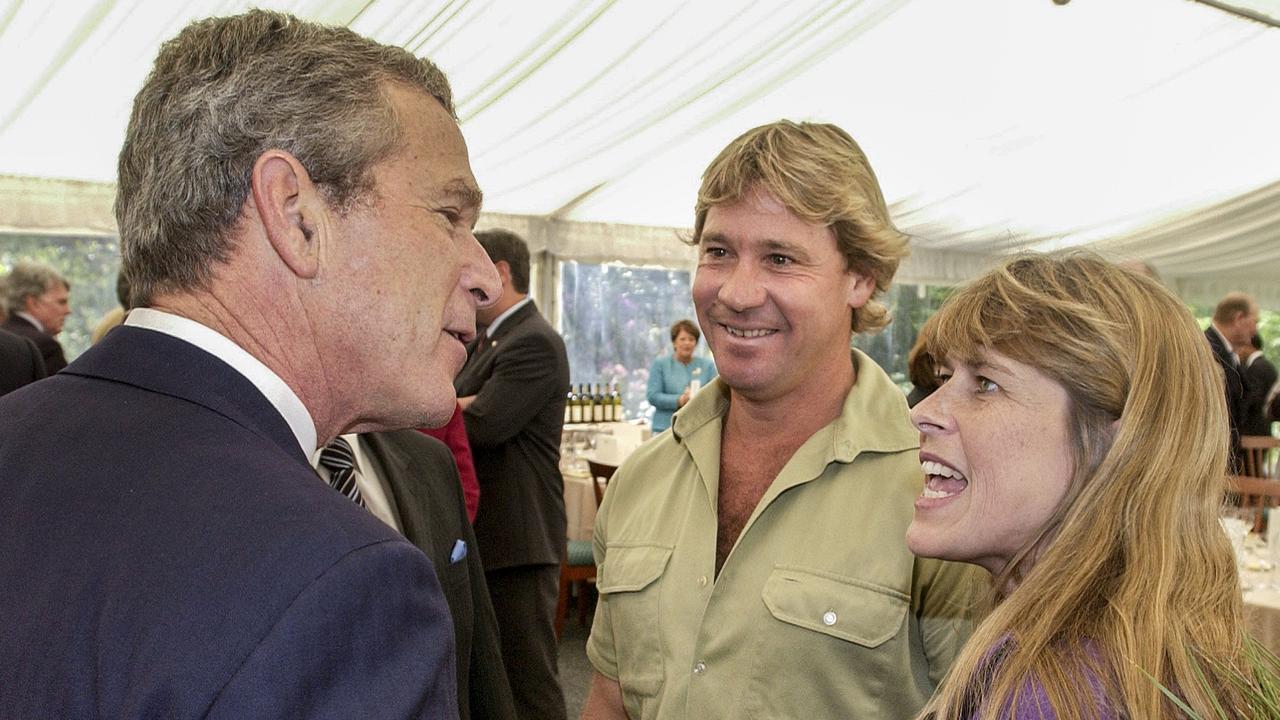For one week in October, 20 years ago, the world came to Canberra, as Australia sought to solidify its trading relationships.
In an “extraordinary occurrence”, United States president George W Bush and Chinese president Hu Jintao addressed the joint houses of parliament on consecutive days.
Mr Bush spent just 20 hours in Australia at the end of an Indo-Pacific tour, but in that time he brushed shoulders with wildlife warrior Steve Irwin and his wife Terri at a gala event.
A trove of cabinet documents from 2003 have been released by the National Archives of Australia on Monday, including a photo of the moment the group met.
In cabinet documents, details of the aviation security arrangements for Mr Bush’s visit have now been released, outlining the Australian Defence Force’s plans to deploy a number of RAAF combat aircraft for 24-hour patrols for the period of Mr Bush’s visit.
During his speech to parliament on October 23, Mr Bush lauded then-prime minister John Howard for his “exceptional courage” in committing Australian troops to Iraq and spoke of his pride in calling his fellow world leader a friend.
Mr Bush defended the controversial decision to use force in Afghanistan and Iraq, maintaining the effort had been about keeping terrorists from acquiring weapons of mass destruction.
As he spoke about the downfall of Saddam Hussein’s Iraqi regime, however, his speech was interrupted by Greens senators Bob Brown and Kerry Nettle, who were later removed.
Cabinet historian David Lee said it was because of Australia’s participation in the Iraq was that negotiations with the US on a free-trade agreement could begin.
The agreement was signed in May 2004 and came into effect on January 1, 2005.
Professor Lee noted the trade agreement was negotiated and signed so quickly because of the context of the Iraq war.
Mr Bush’s fleeting visit to Australia coincided with a four-day trip from Mr Hu, as China was on the cusp of becoming Australia’s most significant trading partner.
During his address to the joint houses, Mr Hu heralded the three decades of diplomatic relations the two countries had already shared, and looked to the long-term.
With economic globalisation developing in such depth, no country can expect to achieve economic development without going for effective economic and technological cooperation with other countries and actively participating in international division of labour,” he said at the time.
It was during 2003 that Australia and China made steps towards a free-trade agreement, and Canberra committed to recognising China as a market economy “in due course”.
Former defence minister Robert Hill said there had been “a much greater optimism” of the China relationship in 2003 and “how it would develop over the years”.
“Of course, what’s happened over the years is, it’s been found out that to separate the values system from the economic relationship has become more and more difficult, and thus the China relationship has run into troubled waters,” he said.
During his speech, Mr Hu also spoke about China’s goal for a “complete reunification of China”, and the hope of a peaceful solution to the Taiwan question.
Beyond China and Australia, cabinet documents from 2003 reveal submissions on other trade agreements were considered, including with Singapore, Thailand, and Japan.
